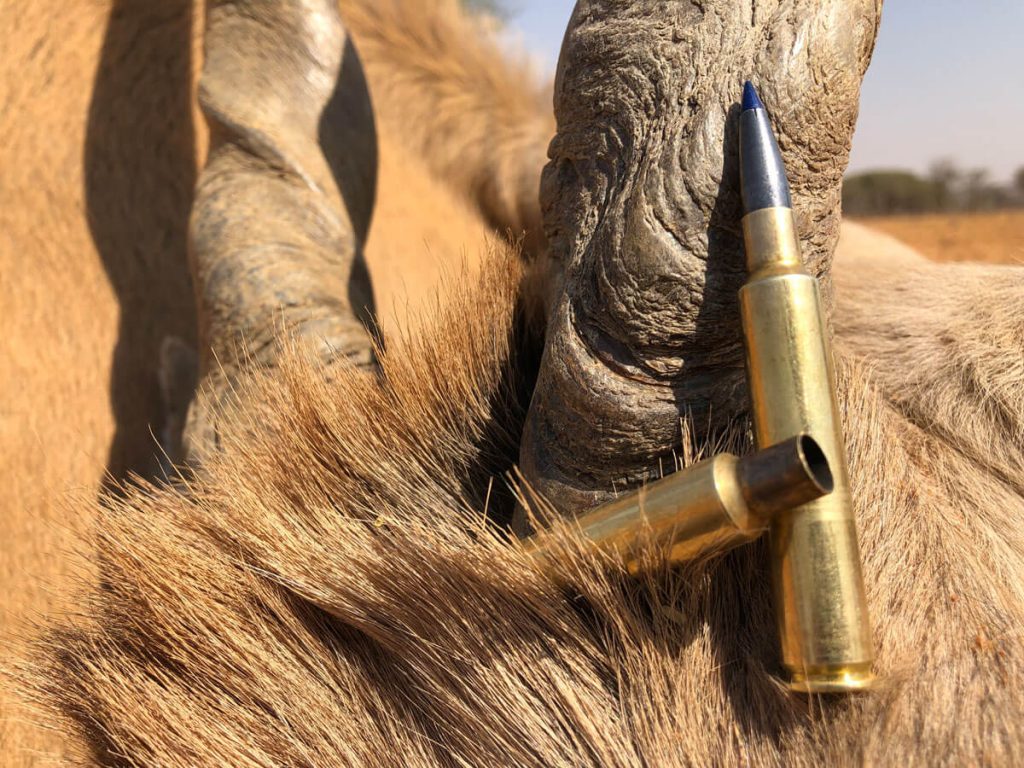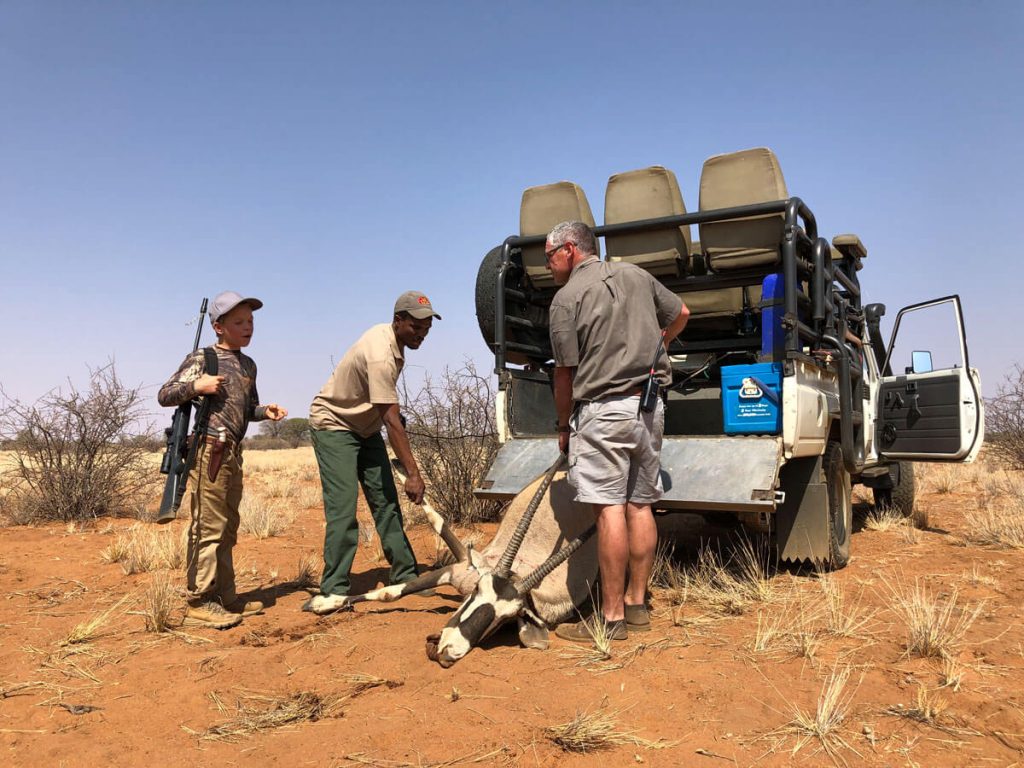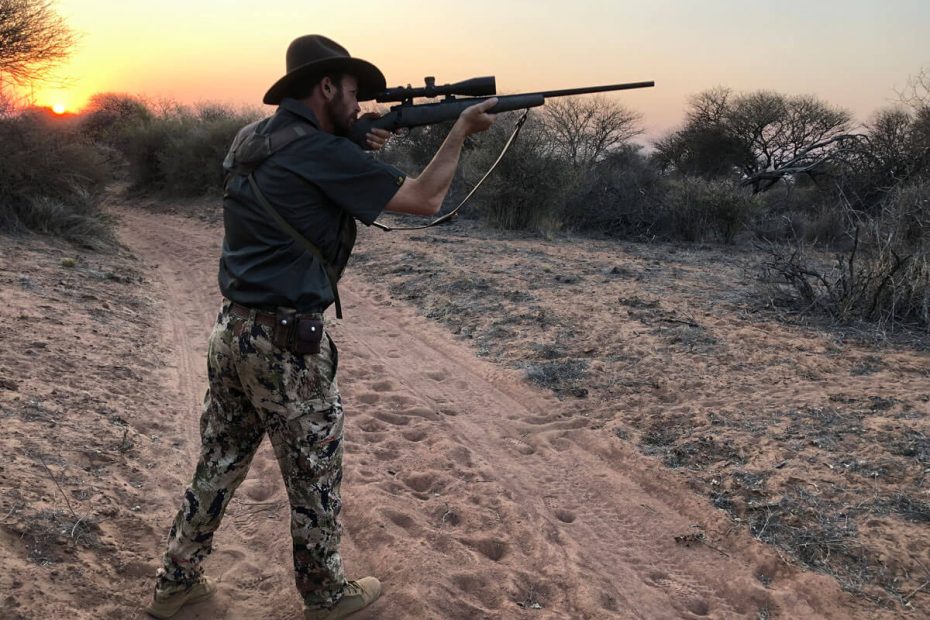
Lunging for my rifle where it leaned against a bush, I slammed a cartridge home in the chamber. A big broken-horned kudu bull broke from the brush, racing full speed from right to left. Swinging with him, I watched my crosshairs catch up, swing through, and pass his vitals. My finger closed on the trigger.
THE SCENARIO
Months earlier I had received the green light from an editor to write about a father and son plains game hunt in Africa. The good folks at Book Your Hunt introduced me to a couple of different Safari Outfitters. Wheels started turning, and a few months and mountains of paperwork later our flight greased onto the Tarmac in Port Elizabeth, South Africa.
One of my main priorities on this trip was to hunt free-range animals. I wasn’t keen on hunting inside high fences, so we made sure that our destination featured wildlife and wild places. Leopard’s Valley Safaris features free-range hunting, so the fit was good. We climbed the mountains of South Africa’s beautiful Eastern Cape, ate great food, and hunted hard. Several days into our adventure my son Josiah shot a nice blesbok, and while we were taking photographs and processing the experience the kudu bull mentioned above crashed our party.

A cull kudu was exactly what we were looking for, so there was no question about whether or not to try to take this broken-horned bull. My rifle leaned ready-to-hand against a nearby bush. The backstop was good, with a gentle brushy hillside rising beyond the running bull. The distance was doable, at less than 100 yards. There were kudu cows running before and behind him, but far enough from him that there was no real danger of hitting one of them should my shot go awry. I had to shoot offhand (standing, unsupported), but that was readily doable at this distance. The only real complicating factor was that he was running. Not just trotting, but at a full gallop.

RIFLE, SCOPE, AND AMMO
The rifle I was using was a bolt action chambered in .280 Ackley Improved with a 24-inch stainless barrel. A Zeiss V4 4-16X50 riflescope nestled securely in lightweight Talley rings. The Timney trigger was tuned to a crisp three pounds. The rifle is not a superlight mountain-type rifle, but instead an all-around medium-weight rifle that balances great and is very steady, which helps make difficult shots doable.

My ammo was hand loaded, using Nosler Brass, H4831sc powder, Federal Gold Medal Match primers, and topped with Federal’s 155-grain Terminal Ascent bullets, which sizzled downrange at 2960 feet per second. It’s a potent combination that has worked flawlessly for me on mule deer, elk, Eland, wildebeest, and more.

TAKE THE SHOT?
Put yourself in my shoes: You’ve traveled all the way to Africa, you’ve been hunting hard, and a bull kudu – one of your favorite species – is finally offering a shot. Your rifle is at your shoulder, finger on the trigger. It’s a rifle that you shoot well, and the range is not long. The only real challenge is that the bull is running full tilt. Your crosshairs move up along the running bull’s body and then out in front, establishing a lead. Do you take the shot?
HERE’S WHAT HAPPENED: TRUE STORY
This story actually happened to me, just as outlined. My crosshairs found a lead, and I pressed the trigger. It was a mistake.
It was a mistake because I’m not good at moving shots. I’ve never spent the time and effort necessary to learn how to shoot at running game, and as a consequence, my lead on this shot was not sufficient. At the shot, the bull twitched, and then turned on the afterburners. The trackers found blood, and we made a circle to try and cut the bull off. We were too late; the bull had already gone by when we arrived. The trackers had followed it for the better part of two miles at this point, and they said that the sign indicated that my bullet had creased the bull across the rump. My PH thought the bull would survive, and we called off the chase. I was a much chagrined and disappointed hunter – I usually make good shots that result in clean kills, and wounding this kudu (however superficially) felt awful. I should not have taken that shot.
I thought a lot about the lead I employed for the shot. My crosshairs were just breaking daylight in front of the bull’s shoulder when I squeezed the trigger. Still, my bullet hit perhaps three feet further back than it needed to. My lead should have been a foot in front of the running bull’s nose to correctly hit him. Clearly, I need more practice at moving targets before I’m qualified to shoot at running game.
Ironically, there are some hunters who could have made that shot and killed the kudu. They have more experience with moving targets and would know how to lead the bull correctly. If you are that hunter, then your answer might be different than mine. I shouldn’t have taken the shot, but perhaps you could.

CONCLUSION
Running shots at game are always questionable. Unless you are an expert at shooting moving targets, you shouldn’t attempt a running shot at an animal, however close it is. It’s just not worth the risk of wounding and losing the animal.
